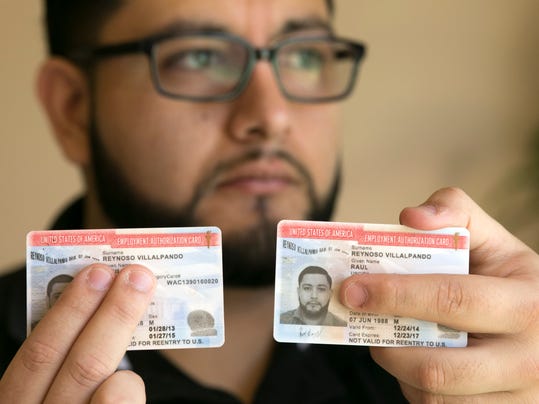 Reynoso is one of more than 100,000 so-called "dreamers" who received three-year work permits under Obama's executive actions on immigration before U.S. District Court Judge Andrew Hanen issued a preliminary injunction temporarily halting the programs in February.
Reynoso is one of more than 100,000 so-called "dreamers" who received three-year work permits under Obama's executive actions on immigration before U.S. District Court Judge Andrew Hanen issued a preliminary injunction temporarily halting the programs in February.
Now Reynoso and the other dreamers are caught a bitter legal dispute over whether the Justice Department intentionally misled the judge by failing to disclose that the government had already started issuing three-year permits to some dreamers.
100,000 'dreamers' could lose 3-year work permits
NRA accuses campus police chiefs of misusing tax dollars by opposing guns on campus
Florida NRA leader Marion Hammer is accusing campus police chiefs from Florida's public universities of using tax dollars to lobby because they spoke in Tallahassee against a bill allowing guns on campuses.
Police chiefs from several Florida campuses appeared in legislative committee meetings in Tallahassee in uniform this week and opposed the bill during public comment periods. In a memo, Hammer asked NRA members to send emails to state officials objecting to what she called tax-funded lobbying.
Slashing a Safety Net: The Demolition of Workers’ Comp
Over the past decade, state after state has been dismantling America’s workers’ comp system with disastrous consequences for many of the hundreds of thousands of people who suffer serious injuries at work each year, a ProPublica and NPR investigation has found.
The cutbacks have been so drastic in some places that they virtually guarantee injured workers will plummet into poverty. Workers often battle insurance companies for years to get the surgeries, prescriptions and basic help their doctors recommend.
Wisconsin Senate passes anti-union legislation amid mass protests
 The Wisconsin state Senate on Wednesday night narrowly approved a proposal to make Wisconsin the 25th right-to-work state in the nation, as thousands of demonstrators protested the measure at the state capitol.
The Wisconsin state Senate on Wednesday night narrowly approved a proposal to make Wisconsin the 25th right-to-work state in the nation, as thousands of demonstrators protested the measure at the state capitol.
The Republican-led state Senate was expected to approve the bill, which would prohibit requiring private sector workers to join or financially support unions, and move it to the state Assembly, where Republicans also hold a majority.
Group protesting Washington police shooting blocks bridge
 People protesting against a police shooting that left a man dead rallied in Washington city, staging a march and at one point shutting down traffic on a bridge over the Columbia River.
People protesting against a police shooting that left a man dead rallied in Washington city, staging a march and at one point shutting down traffic on a bridge over the Columbia River.
The Tri-City Herald reports (http://bit.ly/1MJQxFr) that more than 50 people were in the group of protesters Saturday evening.
Demonstrators blocked traffic along the cable bridge as they slowly marched from Pasco toward Kennewick. Many motorists yelled and honked in support.
As many as 2,800 inmates to be moved from Texas prison
 As many as 2,800 federal prisoners will be moved to other institutions after inmates seized control of part of a prison in South Texas, causing damage that made the facility "uninhabitable," an official said Saturday.
As many as 2,800 federal prisoners will be moved to other institutions after inmates seized control of part of a prison in South Texas, causing damage that made the facility "uninhabitable," an official said Saturday.
Ed Ross, a spokesman for the U.S. Bureau of Prisons, said the inmates who had taken control are "now compliant" but that negotiations were ongoing Saturday in an effort for staff to "regain complete control" of Willacy County Correctional Center.
Thousands of Detroit homeowners face new wave of foreclosures
 Tens of thousands of Detroit homeowners are facing possible foreclosure in the next year as the county cracks down on back taxes owed, which activists say are often extremely inflated because the county assesses property taxes on the basis of their value before the city fell into financial crisis.
Tens of thousands of Detroit homeowners are facing possible foreclosure in the next year as the county cracks down on back taxes owed, which activists say are often extremely inflated because the county assesses property taxes on the basis of their value before the city fell into financial crisis.
When Wayne County officials opened the Cobo Center convention hall in early February to property owners hoping to work out payment plans to save their homes from tax foreclosure, more than 6,000 people streamed through the doors.
More Articles...
Page 71 of 220

 Domestic Glance
Domestic Glance






























